Key takeaways:
- Pro-life advocacy is grounded in the belief that every human life has inherent value, and personal narratives deeply influence this commitment.
- Mental health support plays a crucial role in helping individuals navigate the emotional complexities tied to life decisions and advocacy.
- Counseling can aid pro-life advocates by providing clarity, fostering self-discovery, and building connections to combat isolation.
- Overcoming stigma associated with counseling and embracing a supportive community can enhance personal growth and promote open discussions about mental health.
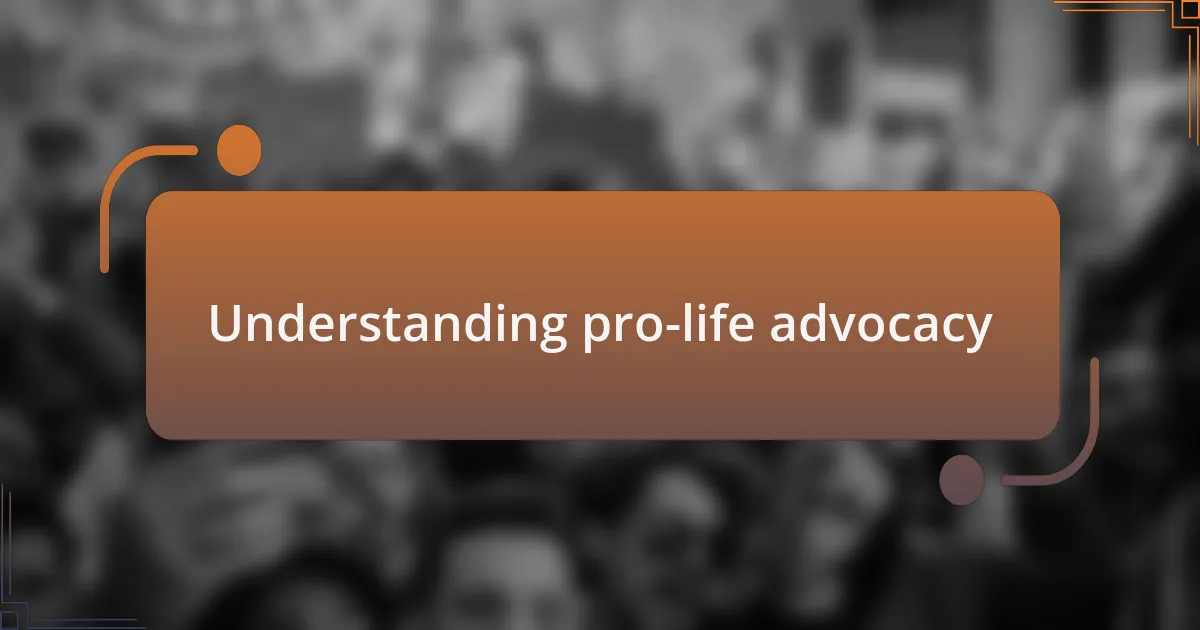
Understanding pro-life advocacy
Pro-life advocacy centers around the belief that every human life, from conception to natural death, has inherent value. When I first engaged with this movement, I was struck by the passionate commitment of advocates who truly believe they are defending the voiceless. Their dedication challenges me to consider my own perspectives and the ethical implications of life and personhood.
I remember attending a local pro-life event, surrounded by individuals sharing their stories of hope and resilience. It was there that I recognized the deep emotional ties that people have to this cause—not just as a political stance, but as a personal mission to protect lives. Have you ever paused to consider how individual experiences can shape our views on such a complex issue?
Understanding pro-life advocacy requires acknowledging the diverse narratives that fuel it. I’ve often thought about how important it is to listen to these stories, as they can reveal the profound impact that life decisions have on families and communities. It makes me wonder: how can we better engage in this dialogue to create a more compassionate approach to life issues that resonate with everyone?
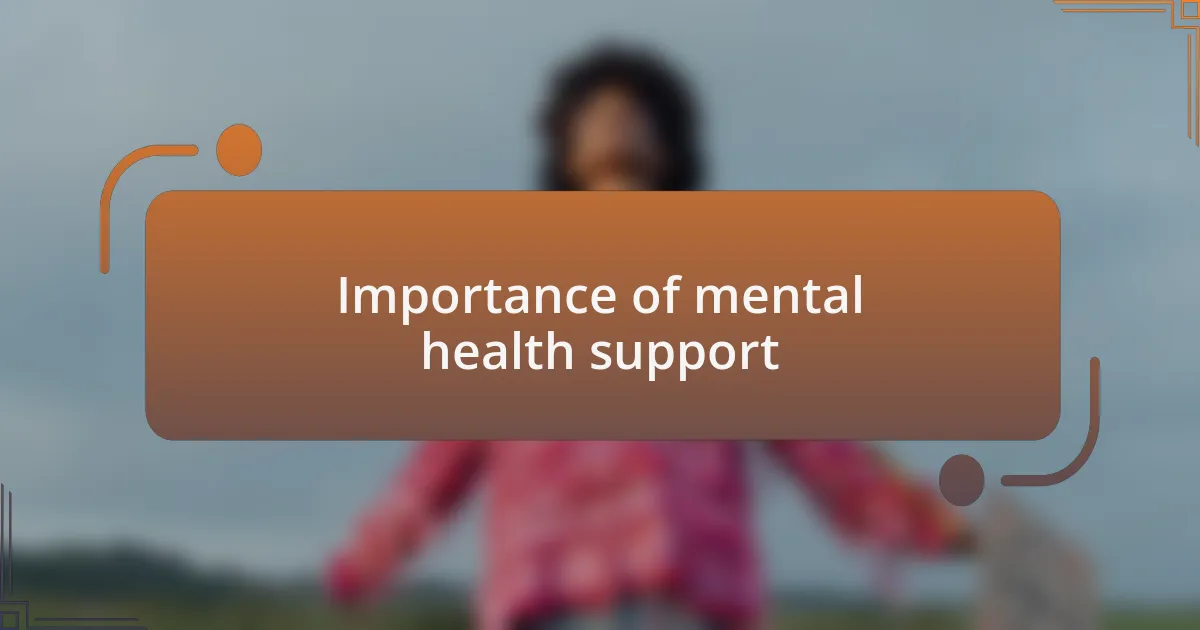
Importance of mental health support
Mental health support serves as a vital lifeline, especially in the context of the emotional complexities surrounding pro-life advocacy. I recall a friend who faced a challenging pregnancy; the emotional toll was immense. She openly shared her struggles with anxiety and fear, and it was evident that having access to counseling helped her navigate those feelings, ultimately leading her to make a more informed and empowered choice regarding her future.
The journey of fostering life is often tangled with a myriad of emotions, and it’s essential to address them head-on. Have you ever felt overwhelmed by the responsibility of your beliefs? I have. Seeking mental health support can provide the safe space needed to unpack those emotions, allowing us to process our thoughts and come to terms with our experiences. It’s a reminder that acknowledging our mental health is not a sign of weakness but an essential component of our overall well-being.
Additionally, mental health support can enhance our ability to engage with others compassionately. I’ve seen how a supportive environment can create a more informed community, where individuals feel safe to share their struggles and victories. Isn’t it interesting how our personal growth can set the stage for more meaningful conversations around life choices? Investing in our mental health equips us to advocate for others with empathy and understanding, reinforcing the value we place on every human life.
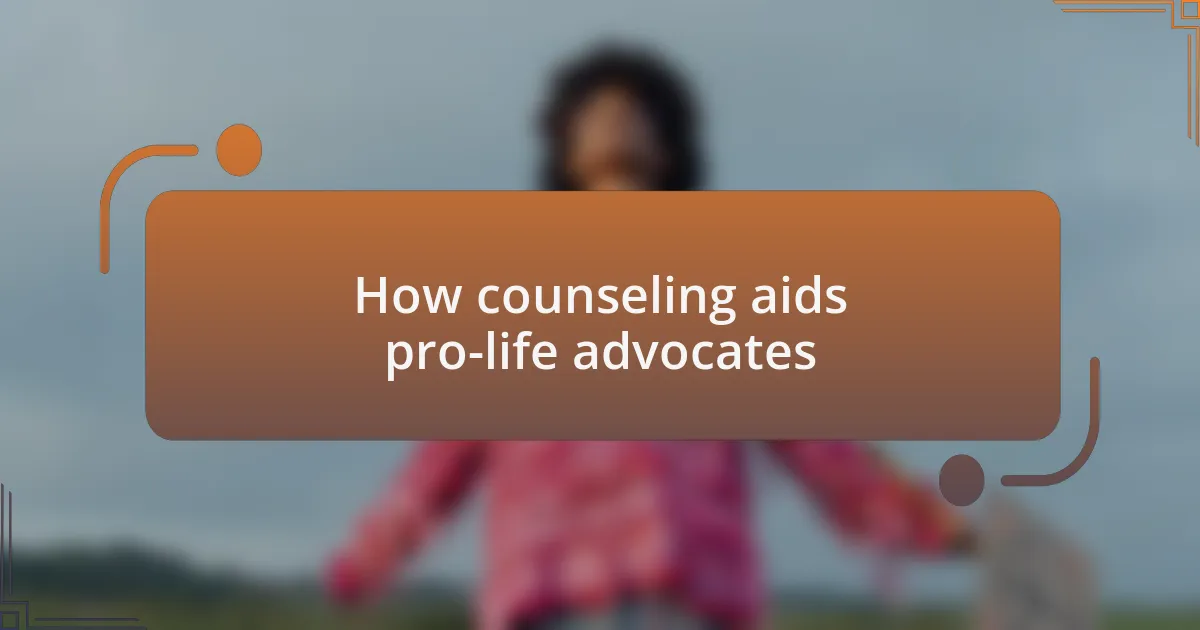
How counseling aids pro-life advocates
When pro-life advocates engage with counseling, they often find clarity and reassurance in their mission. I remember a time when I felt particularly discouraged about the state of reproductive policies. Speaking to a counselor helped me regain my focus, transforming my doubts into actionable steps. This level of emotional support can empower advocates not only to cope but thrive in challenging environments.
Counseling also offers a unique opportunity for self-discovery, allowing advocates to explore their motivations for supporting life. Reflecting on my own experiences, I’ve realized that understanding my core values has deepened my commitment to the cause. How can we effectively advocate for others if we haven’t first aligned with our own beliefs? A strong mental framework enables us to convey our messages with authenticity and passion.
Furthermore, navigating the often polarizing landscape of pro-life advocacy can lead to feelings of isolation. I once felt disconnected from those around me, until I sought support and realized that my experiences were shared by many. Counseling fosters connections that not only counteract isolation but also build a network of advocates ready to uplift one another. Isn’t it comforting to know that we don’t have to stand alone in our convictions?
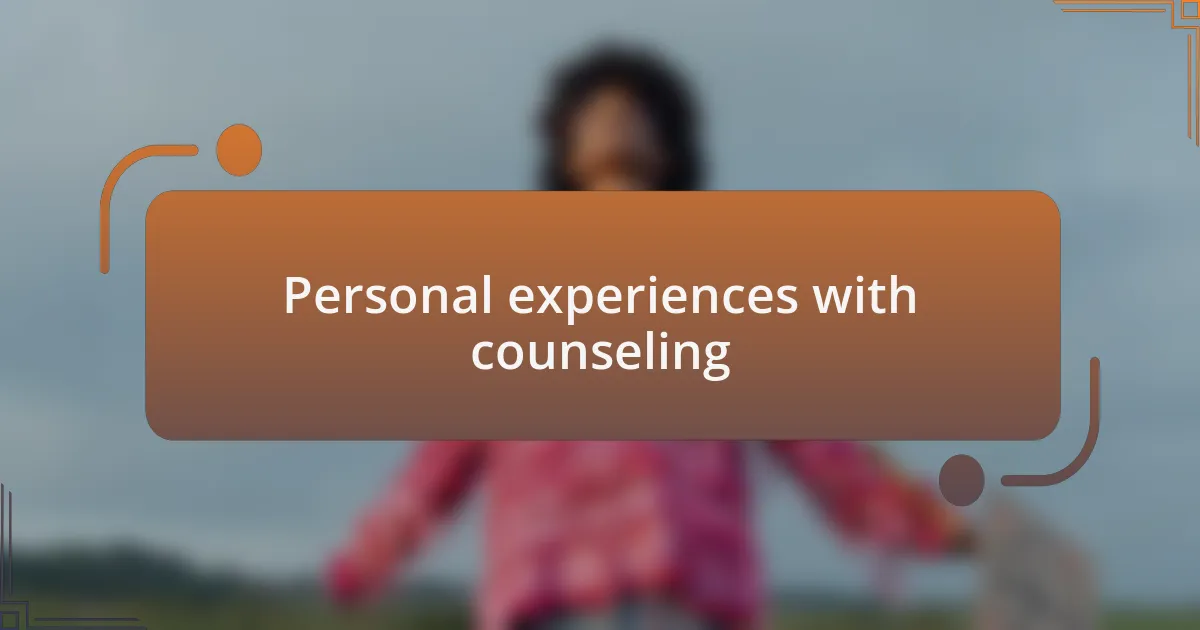
Personal experiences with counseling
Seeking counseling can be a transformative experience, especially during moments of uncertainty. I recall a period when I was overwhelmed by the emotional weight of my advocacy. Sitting with a counselor allowed me to express my fears and frustrations openly. It was eye-opening to realize that sharing my struggles not only alleviated my burden but also forged a stronger resolve to advocate for life.
I often think about how counseling opened doors to deeper self-reflection for me. There was a session where I distinctly remember being asked what truly inspired my passion for this cause. That simple question helped me uncover layers of my own values and fears. It made me realize that nurturing my emotional health was just as vital as the work I was doing. How often do we stop to assess what motivates us?
Additionally, I learned that the counseling process provides a safe space to connect with others. I met fellow advocates in group sessions, and hearing their stories was incredibly validating. It was reassuring to know that many shared my struggles and triumphs. Isn’t this shared experience fuel for our advocacy journey? By supporting one another, we build a stronger community and reinforce our mission together.
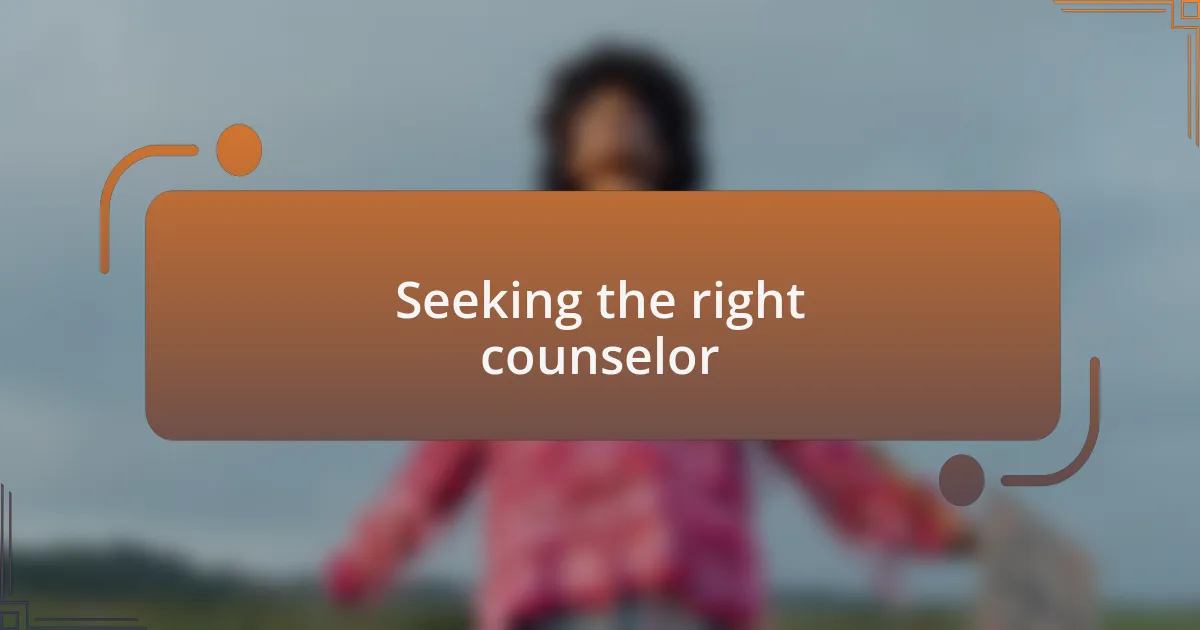
Seeking the right counselor
Finding the right counselor can feel like a daunting task, but it’s essential for fostering personal growth. I remember when I was searching for someone to talk to; I didn’t just want a professional—I craved someone who understood the complexities of pro-life advocacy. I met with a counselor who not only listened but also shared insights that resonated deeply with my experiences. Have you ever left a session feeling that burden had been shouted into the wind? That’s what I sought.
Another key factor is ensuring a counselor’s approach aligns with your beliefs and values. I once had a session with a counselor who didn’t quite understand the moral intricacies of my views on life. While I learned valuable coping strategies, I felt a disconnect that hindered my progress. How can we truly open up if we feel misunderstood? Finding someone who respects and engages with your beliefs can create a liberating atmosphere where healing can truly begin.
Lastly, consider the importance of personal rapport. It took me multiple sessions to realize that feeling comfortable in that chair is just as critical as qualifications on a paper. In one instance, after a particularly heavy discussion on my feelings about loss, my counselor shared how these emotions can be channeled into advocacy for life. It was in that moment I recognized the power of authenticity in our conversations. Who doesn’t want a partner in their journey who genuinely gets it?
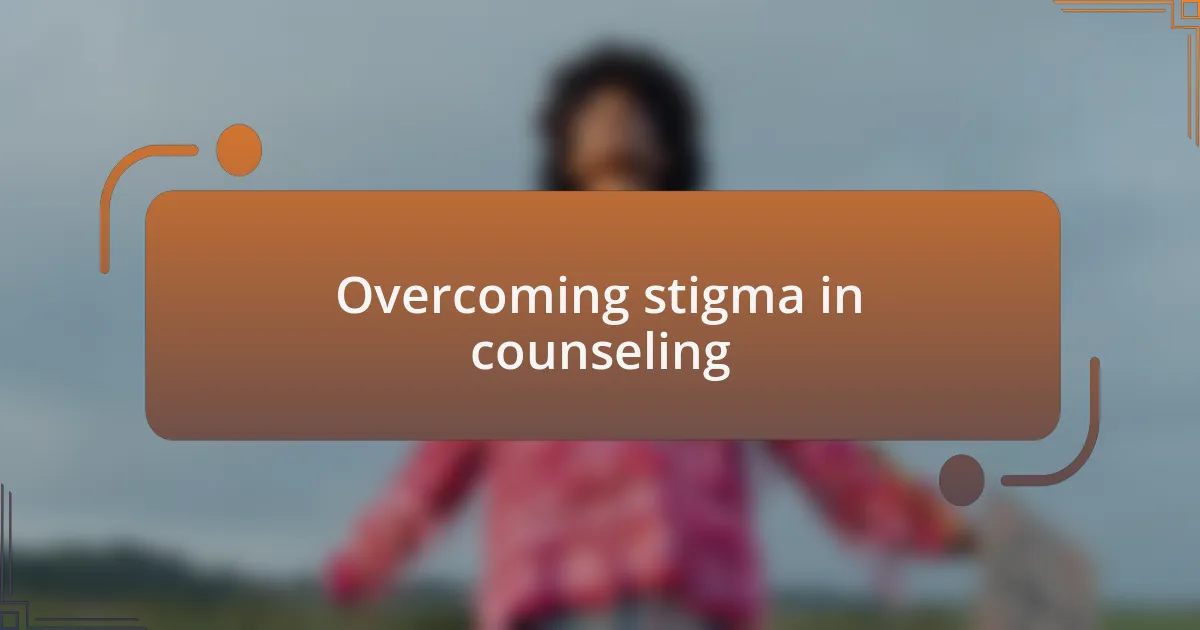
Overcoming stigma in counseling
The stigma surrounding counseling can often feel like an invisible barrier. I’ve felt it myself—hesitation pulses through when you consider who might judge you for seeking help. When I decided to reach out, I worried about how others would perceive my vulnerability. But I realized that recognizing this stigma is the first step to dismantling it. Why should we let societal perceptions dictate our mental well-being?
I remember sharing my experiences at a local gathering of pro-life advocates, where a few expressed their discomfort with counseling. It surprised me how many had walked the same path of doubt. We often view counseling as a sign of weakness, yet it’s a courageous step towards strength and resilience. I came to understand that every conversation about mental health helps normalize it. Have you ever considered how sharing your journey could encourage someone else to seek the support they need?
Addressing stigma isn’t just about our own journeys; it’s also about uplifting others. I’ve made it a point to advocate for mental health discussions within my community. When I opened up about my sessions, I witnessed a ripple effect—one conversation led another to share their own stories and seek help. It’s enlightening how breaking the silence creates a space for healing. Isn’t it powerful to think that your openness could inspire someone else to step forward?
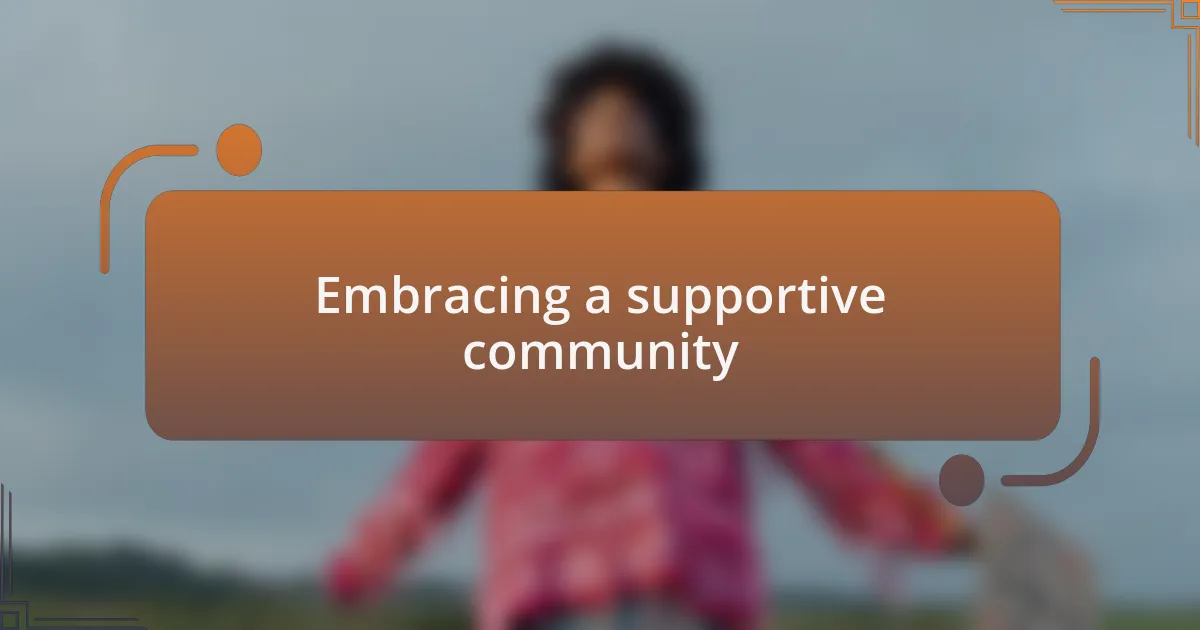
Embracing a supportive community
Belonging to a supportive community can profoundly impact those seeking counseling. I remember attending a small, faith-based group discussion where individuals shared their counseling experiences openly. Hearing their stories made me realize how powerful it is to be among people who not only understand your struggles but also validate your feelings. Doesn’t it feel reassuring to know you’re not alone in your journey?
Finding empathy in shared experiences can be deeply healing. Just the other day, a friend shared how her support group inspired her to pursue counseling after a difficult pregnancy. It reminded me how important it is to create an environment where individuals feel safe to express their emotions. Have you ever thought about how simply listening can make a world of difference for someone in need?
Cultivating a community that embraces mental health discussions is crucial for personal growth and healing. I’ve seen firsthand how my own proactive approach to talking about therapy has encouraged friends to seek help. Imagine what could happen if we all committed to fostering these connections. It’s about creating a culture where vulnerability is not just accepted but celebrated. How can we make our communities more conducive to those brave enough to seek support?